Dispatch from Day 1 in Jackson: Eating BBQ, Talking with Students, Standing Up for Abortion Rights
by Sunsara Taylor | October 31, 2013 | Revolution Newspaper | revcom.us
Yesterday we arrived in Jackson, Mississippi, in the early afternoon. All the way down we were buzzing among ourselves about how outrageous it is that there is only one abortion clinic left in the State of Mississippi! We kept going back to the courage and moral example of Dr. Willie Parker, one of the two doctors who regularly flies into Mississippi to provide abortions, who had recently spoken about this at a program sponsored by Stop Patriarchy with me at Revolution Books in New York City. We also recalled the other courageous doctor and the staff at Jackson Women's Health Organization, the escorts and local supporters of the clinic (like those with Wake Up Mississippi and the Hell No Campaigners who stood up against voter restrictions and a state amendment that would have granted personhood to fetuses a few years back) who we met during our time down here during the Abortion Rights Freedom Ride last summer. And we swapped stories about the Christian fascist groups like Operation Rescue and Operation Save America who will be terrorizing the last abortion clinic in Mississippi from November 2–6 and what it will be like to stand up against them all week.
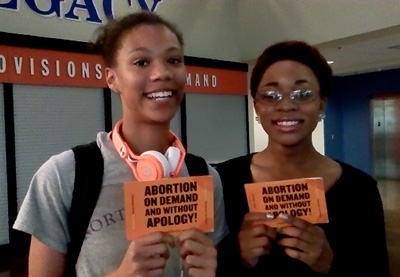
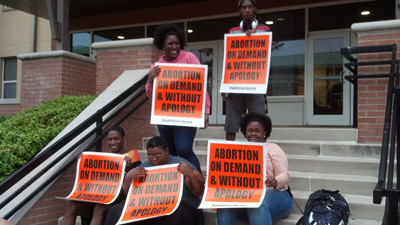
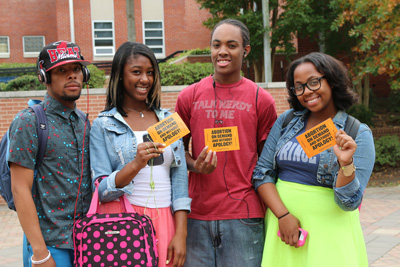
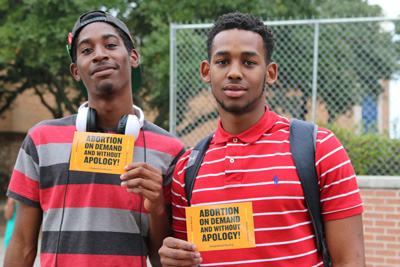
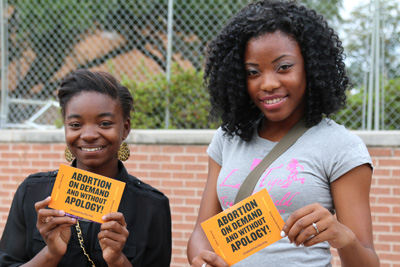
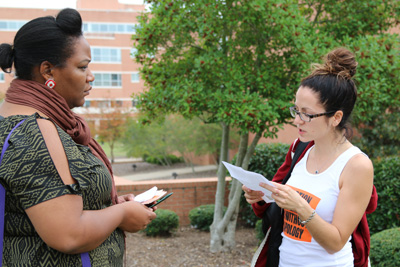
Upon getting in, our original plan had been to go right to where we are staying, get situated, and begin working through our plans for the week. But, we were hungry and we couldn't resist the pull of some for-real Southern barbeque. Before long, we were stuffing our faces with pulled pork, barbequed chicken, potato salad, baked beans and extremely fried catfish at E & L's barbeque. After spending an inordinate amount of time negotiating their very straightforward menu, a guy tending the barbeque asked where we hailed from. We explained that we were from New York and then another guy there shared with us the history of the place, explaining that E&L's was started by a family that had traveled up to Chicago during the Great Migration, ran a successful car dealership for a while, and then relocated back in Jackson at least a generation ago to return to their roots. As we ate, we began talking about the history of the area as well as about the neighborhoods we had just driven through.
As I said, last time we were in Jackson (just two months ago as the culmination of the Abortion Rights Freedom Ride), our plans required us to mainly focus our time at the clinic and we didn't get out and see much of the area. It's not that yesterday we explored all that broadly, but what we saw struck me as a cross between the devastated and abandoned downtown and neighborhoods of Detroit (where you can see sky through the skeletons of once sturdy buildings, and crumbling, still-occupied residences are surrounded by blocks abandoned lots and debris) and the barely-standing shotgun houses I became familiar with in the Ninth Ward of New Orleans after Hurricane Katrina. We are definitely in the Deep South and it is clear that many of the people here are living in the same homes and nearly the same conditions as their parents and grandparents and great-grandparents did generations before them. About 80 percent of Jackson is African-American and the rates of poverty and of poverty-related health problems, such as obesity, diabetes, HIV, hypertension, unplanned pregnancies, and infant mortality are extremely high. When you spread out across the state, these trends continue with devastating effect. We will be getting out into some of these neighborhoods while we are here; these are some of the folks who will almost certainly not be able to find the resources to travel to another state if the Jackson Women's Health Organization gets closed down!
After our meal, we hopped in our car and drove to two of the local college campuses. Millsaps College is a small (about 900 students) private school with mostly white students. When we arrived, few students were milling about. The one student that we spoke to, a young white cheerleader from San Antonio, Texas, told us enthusiastically, "Well, you have come to the right campus!" when we explained that we had come to town to rally support for abortion rights and for the last clinic in the state. She said that most students either support that right, or "at least are here at college so they are thinking about things in a different way for the first time, even if they don't end up agreeing with you." She took us on a walking tour of the campus and offered to post information about the week's abortion rights activities on Facebook.
We strolled around a bit more and took note of upcoming activities that were posted where we might meet students and once again piled into the car to head back to where we are staying.
Yet, once again, we just couldn't resist the pull of getting out and about and seeing more of Jackson.
So, instead, we drove down to Jackson State University. This is a Historically Black College and in my mind has always been most famous for being the sight where two student protesters were killed by state police just a few days after four students were murdered by the National Guard at Kent State University during a 1970 nationwide student strike against the Vietnam War. I had always thought that those killed had both been students at Jackson State, but when we read the plaques we learned that one (Phillip Lafayette Gibbs) was a student there and one (James Earl Green) was a local high school student, only 17 years old. Both were killed by shotguns, 12 others were injured, and over 400 rounds of buckshot struck the women's dormitory in the course of the vicious police assault on these righteous young student protesters. The incident is noted as a "tragedy" on the university's plaque, but really these were crimes of the system and of the local police. They were murderous crimes carried out as part of defending an even bigger and more murderous crime: the imperialist system's genocidal war in Vietnam and invasion of Cambodia. Standing there and reading about the two students and the tremendous wave of protests and uprisings among young people that swept the country at the time was an inspiring and important reminder of the fact that even here, in the "belly of the imperialist beast" as many once called it, millions can be brought forward to stand up and fight with tremendous courage and self-sacrifice for a whole better world. The heroism of these students and others like them needs to be popularized and emulated today, even as we must go all the way this time in making real revolution, actually breaking through to realize a whole better world.
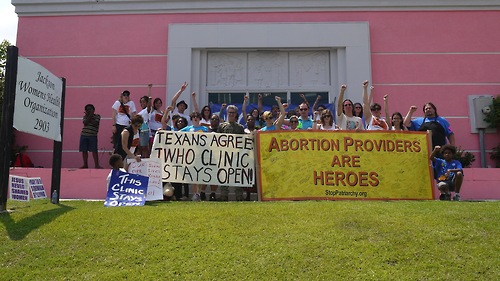
In August 2013 the Abortion Rights Freedom Ride joined others in Jackson at the Jackson Women's Health Organization to say "This Clinic Stays Open!"
We decided to talk to some students and get a feel for the campus. Over and over again we were struck by how open the students were to talking about abortion rights as well as about their lives and deep concerns, and by how deeply a great many of them support this right.
A couple of young Black men sitting in the student center answered yes when a friend and I asked if we could sit and talk with them a bit. When asked what they thought about abortion, the first one explained, "Well, I am a man so I am never going to deal with anything like that so it's not really up to me." I posed back that while I respect his sentiment that this decision should be up to women, it is everyone's responsibility—men and women—to stand up for this right because it is under attack. I asked if he knew that there was only one abortion clinic left in the entire state of Mississippi. He had no idea and explained that he is from Chicago. But he knows a lot of women who have needed abortions and he doesn't think it is right for people to tell women they have to have children they can't take care of. His friend, also from Chicago, interjected, "If they take away abortion, women will end up doing things to hurt themselves. They are still going to try to stop the pregnancy." It is interesting that he knew this, since our experience on the Freedom Ride demonstrated that most young people don't really know anything about the dangerous measures women went to before abortion was legal. He explained that he had two really good teachers in high school, teachers who told him about the world and got him and other students thinking. One day this teacher had shown him the movie If These Walls Could Talk (a film which I highly recommend!), which included a story of a woman who died from an illegal abortion back before Roe v. Wade.
We told them about the Christian fascists coming to town to try to shut down the last clinic here and they expressed a lot of interest in joining us and local clinic supporters in standing up against them on Saturday. One said he would ask his professor if coming to it could be counted for his community service requirement. Then, one of them said, "I really agree with what you all are saying, but I don't really see what difference we can make about it." I posed back to him, "If people had thought that way during the Civil Rights Movement, we wouldn't even be sitting here together today talking about this." His eyes got wide and his whole body moved back as if from some physical impact of my words and he nodded, "Yeah, you are right. I see what you are saying. Yeah, I can do something." They gave their phone numbers and emails and took a small stack of fliers to get out to their friends.
Before we left them, we spoke some about how this assault on women's rights is connected up with other crimes of the system—from the acquittal of George Zimmerman and everything that concentrates to the massive poverty and exploitation both in this country and even more around the world, and other outrages. While they nodded and agreed with what we were laying out, especially expressing anger about what had been done to Trayvon, they also said the idea of revolution was a bit too big and more than they were ready to handle. "I am with the revolution, but I am not with it... you know, I kind of agree... but then I don't think I can do that... You know, it's hard for me to think about it," the guy who'd talked about illegal abortions said. It became clear that he was having a hard time thinking about revolution not only because he didn't know that much about it, but also because he was merging "thinking about it" with "deciding to do something about it." While both are important, we insisted, you have to allow yourself to think about something in its own right, to consider whether it is true or not and right or not, without troubling yourself immediately with what you are going to do about it. Yes, you need to make a moral decision about whether to get involved in something—and, yes, we are struggling with students right now to take a stand for abortion rights and women—but we also are fighting to open up people's THINKING about this, and about bigger questions, and it is important that people allow themselves to consider new things without immediately worrying about the implications of them. "How would you really know if you want to relate to something like a revolution," I posed back, "if you don't let yourself even think about it?" Thinking and doing, while related, are not the same thing!
Not far from us, one of our crew was talking to a group of young Black women. They were animated and enthusiastic to hear that we were supporting abortion rights. Quite a few of the students we spoke to told us about how last year a group of anti-abortion protesters had set up on campus with enormous signs of bloody fetuses and comparisons between abortion and the Holocaust and Slavery. While some had been influenced further against abortion because of these images, quite a few were still outraged and this added to their enthusiasm in meeting us.
One of these young women told us that she knew the Jackson Women's Health Organization very well. She said she had gotten pregnant while she was in high school and there was no way she was ready to have a child. Her mother had brought her there and if it weren't for that abortion she would never be in school today. She loved that clinic and was still angry at the protesters who had harassed her on her way in. Her friend talked about getting into it with the anti-abortion protesters who had been on campus the year before. One of these "pro-life" fanatics had told her, "Jesus told me to tell you that you will go to hell if you support the murdering of babies." "Oh?" she posed back, "I didn't know you could just talk to Jesus like that. Well, in that case, please tell Jesus I say, 'Hey!'" This got the guy furious and he began yelling, "This is no joking matter!" The student was proud that she had gotten him so riled up and proceeded to explain that in her understanding of religion, "Jesus forgives and it is not human's place to judge."
At this point, another student piped up. She said, "My father is a pastor and I know that Jesus doesn't judge. I support women's rights no matter what my dad says." It was striking how many women throughout the day insisted on using the Bible and their religious faith to defend their support for women's right to abortion. Repeatedly they invoked that it was not the place of human beings to act as the judges of others' behavior. At the same time, within this there was still the assumption that there was something wrong with abortion. Many times we heard people, particularly women, say, "In the Bible it says that one sin is not greater than another sin, so they [the anti-abortion people] can't judge."
Also, over and over, people told us that while they felt that abortion is a necessary right and that a compassionate society will provide this right for women, they continued to talk about abortion as something necessary when a woman makes a "mistake." Now, if someone were to fall down the stairs and break their arm, we wouldn't talk about them having made a "mistake" in the moral sense. We would say they had an accident and they need medical care. But when it comes to unplanned pregnancy, these students didn't call that an accident, they spoke of it as a "mistake." This carries the implication that she has done something wrong either by having sex or in some other way. This really didn't strike me as fully until after we had left this group, but since they gave their numbers and promised to come out with us in the days to come I definitely intend to talk with them more about this.
With these women, as well as with others that we met, many spoke very strongly about how, "It used to be the case that women were thought of as just an extension or a possession of their husbands. But that is not how things are anymore and we are not going to stand for people pushing us back to that." This was starkly different than, say, our experience at the mall among mostly white people in Wichita, Kansas. And certainly this was different than our experience up at some of elite universities in New York City and elsewhere. What accounts for this difference, for the fact that there was so much acute awareness of the past treatment of women openly as property? Partly, I think this was because we were at a university where there are people from all over mixing it up and because people are studying all sorts of subjects that are expanding their horizons, as compared to a place like the mall in Wichita. But at the same time, there was a much more intimate awareness of—and problem of intimate connection to (in the women's own families, the lives of the mothers and grandmothers)—the fact that the social position of women and of Black people has undergone dramatic changes in the lifetimes of their families. This contributes to them seeing the question of abortion and of the overall societal role of women being one that is definitely not permanent; and their acute sense of the possibility of women being pushed back to the way things used to be is much more vivid and real.
One of the young women in this group also began to talk about how when abortion was illegal many women died. Her friends all quieted and listened to her, it was clear that some of the rest of them didn't know this. One of the most moving things during our first afternoon in Jackson, especially at Jackson State, was watching as groups of friends began talking about the subject of abortion, of religion, and of women's role in society with each other after we brought the subject up. Some had very advanced sentiments and understanding that they began sharing, filling in gaps in the understanding of others and forging a sense of eagerness to collectively explore these questions more together and to take part in standing up.
Of course there were a lot of negative attitudes towards abortion as well, and a lot of religious underpinnings to this, but it was also clear that no one had ever had anyone speak about abortion with them openly and positively and that when this happened a lot of new thinking and genuine questions often opened up. People who were against abortion listened intently to what we had to say about it as well as what their friends had to say. Many would quickly concede that if a woman were raped or if there was something wrong with the fetus then an abortion should be allowed. From there we would go deeper and while we didn't totally change the views of those who were against abortion, we certainly gave them a different framework to consider (that fetuses are NOT babies, abortion is NOT murder, and women are NOT incubators), and we gave a lot of confidence and backing to those who do support this right to want to and be able to argue and fight for it.
One young man who admitted to us that he had been very shaken up by the bloody fetus images of the anti-abortion protesters last year, after we spoke for a while about the science of what an abortion actually is [http://revcom.us/a/315/what-is-abortion.html], gave us the suggestion, "Maybe if you show pictures of what a good abortion looks like, that might help people like me." It was a very good suggestion and it underscores why we who support abortion rights and women's liberation have to go beyond simply talking about "choice" and the extreme circumstances of some women, and talk about the biology and science of human reproduction, about what a fetus actually is and how an abortion actually works, and how all of this is most fundamentally about the social role of women!
All this was only based on talking to a relative handful of clusters of students over the course of about an hour and a half. Obviously, there is so much more to do and more we will need to write about and share, but just as we couldn't resist getting out around Jackson at least for a few hours on our first afternoon in town, I also couldn't resist sharing with you at least the first taste of what we have encountered here. Stay tuned for more. And, most of all, if there is any way you are able—it is NOT TOO LATE to come down here to Jackson, to join with us and others in standing up for Abortion On Demand and Without Apology and in defense of the last abortion clinic in Mississippi!
Come to Jackson! [http://www.stoppatriarchy.org/get-involved.html]
Donate to these efforts. [http://www.indiegogo.com/projects/abortion-rights-emergency-in-mississippi-albuquerque-you-are-needed-now]
Spread the word.
Send a message of support. [http://www.stoppatriarchy.org/get-involved.html]
And become an ongoing part of the movement to End Pornography and Patriarchy: The Enslavement and Degradation of Women! [http://www.stoppatriarchy.org/contact.html]
If you like this article, subscribe, donate to and sustain Revolution newspaper.
